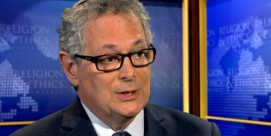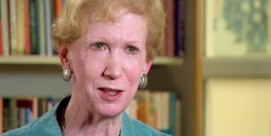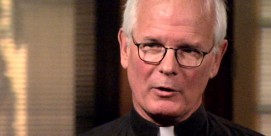In This Episode << SLIDE LEFT TO SEE ADDITIONAL SEGMENTS
Brad Wilcox Extended Interview
Read more of Betty Rollin’s interview on religion, parenting and the RELIGION & ETHICS NEWSWEEKLY poll on Faith and Family in America with Professor Brad Wilcox:

For many parents, religion is a key source for the moral formation of their kids. It enables them to give their kids a sense of moral direction in this world, and that applies across the board. More conservative religious parents, be they Muslim, Catholic, Protestant, or whatnot, tend to be more invested in parenting, in part because they want to convey their faith to their children, but also in part because they are worried about a culture that they see as debased and debasing. They want to protect their kids from that culture. Those are two key points that I see in my work on religion and parenting. Parents across the religious and ideological spectrum see religion as a key source of moral direction for their kids. It’s also why we see that the highest level of [church] attendance for adults is for folks, particularly men, who are married with kids. Once their kids are at a certain age, between six and 12, they want to get involved with a local church or synagogue and get their kids integrated into the life of that congregation.
What we find in general is that parents who are more religious and are also affectionate and firm with their kids — it is both their religiosity as parents … [and] their parenting style — that these two things when they work in concert are likely to ensure that they will transmit the faith that they have to their children. If they are very religious themselves, and if they are affectionate with their kids, and also if they are firm — if they have not an overly strict but a firm approach to discipline — they are more likely to convey their faith to their children.
We know, for instance, that children from evangelical homes are more likely to remain in that tradition, about 80 percent of kids from those homes. And in mainline Protestant traditions it’s closer to 60 percent. A big part of that difference is the difference in the faith. Evangelical parents tend to have a stronger faith, which then makes their kids more likely to abide in that faith. Likewise, about 75 percent of Catholic kids would persist in the faith of their parents. I don’t have numbers for Jewish and Muslim children.
Parents who are too strict with their kids, who are authoritarian parents, are more likely to see their children rebel, both with respect to their moral beliefs as well as their religious beliefs. There is a kind of continuum. Parents who are too permissive are going to see their kids go off, and parents who are too strict are also going to see their kids leave the faith. There is this dynamic, particularly when it comes to issues of control and discipline. Parents who give their kids some latitude but not too much are more likely to see their kids stick with the faith.
There is a new survey that was conducted out of the University of North Carolina which shows that kids who are more religious are less likely to use drugs, to abuse alcohol. They are less likely to be delinquent. They are less likely to be depressed. So there is an association between weekly religious practice and also having a strong religious self-identity and being less likely to fall into social trouble and also less likely to experience psychological distress.
The RELIGION & ETHICS NEWSWEEKLY poll indicates — and this goes to the issue of more traditional religious parents being more concerned about the broader culture — that about half of evangelical Protestant and traditional Catholic parents are concerned about sex and violence in popular culture, and this compares to about a third of parents of other traditions and secular parents. There clearly is this gap between the more traditional and less traditional religious parents when it comes to their concern about our popular culture. That’s a very interesting finding for the R & E poll.
Another interesting finding from the poll is that parents in traditional families, that is, married parents with kids, are much less worried about their kids than parents in single-parent or nontraditional families. So there is something about that family structure that makes the more traditional parents less worried about the schools their kids are in, the values their kids are being exposed to. They are also slightly less worried about transmitting their faith to their kids — though that’s a smaller effect there.
The poll suggests that parents who are in more traditional families are less worried about their kids, probably in part because they are more integrated into their religious communities. Parents whose kids are more religious are likely to see their kids do slightly better in school, and also to see their kids much less likely to be involved with alcohol and drugs, to be delinquent or to experience psychological distress — things like depression, for instance. It lasts at least into young adulthood. With anything like this there is always a question of persistence. Kids who persist in a religious faith will see these effects continue into their lives. But kids who drift away from religious practice over five or 10 or 15 years are going to be less likely to experience the benefits of religious practice.
Particularly among more moderate and liberal religious parents, one of their key concerns, their key motivations in bringing their kids to church, synagogue, or even mosque is to give their kids some religious and moral formation that they hope will protect their children. Whereas for the more traditional or devout religious parents, a key motivation for them is also, of course, to really give their kids a strong faith.
I think it’s always been the case that religion has always been a key part of a parent’s tool kit. But I think there is a new concern, particularly among the more traditional parents, about the nature of popular culture in our society, and that concern motivates them to be even more dedicated parents and to do more to get their kids engaged with their faith. More traditional parents also recognize that other institutions, schools, and the popular culture are less likely to be supportive of their faith, and so there’s more of a sense on their part that they have to step up and take more responsibility for the transmission of their faith, because other institutions are going to be less likely to do the job for them. The RELIGION & ETHICS survey, for example, finds that 6 percent of American parents are home schooling. That’s actually the highest number that I’ve seen in these kinds of surveys. It suggests to me that one of the reasons, among others, that these parents are home schooling is to provide a sense of their faith and their moral beliefs to their kids.
The poll also indicates that about a third of interfaith families think their kids will have the faith that they do, and that compares to about half of parents who share the same faith. One clear take-away here is that parents, I think accurately, recognize that they are more likely to transmit their faith if they share that faith with one another, and they are less likely, of course, to transmit a faith to their kids if they don’t share the same faith.
What tends to happen in interfaith families is that the parent who is more religious tends to be in the driver’s seat with respect to things like holidays and is the one who tends to influence the children more when it comes to their own faith. We also know that interfaith families do experience more tension around faith for obvious reasons, and they are more likely to experience marital distress and divorce. We know that kids from interfaith families are more likely to become secular as they enter young adulthood. As with anything, whether it is politics or religion, when there are clear differences between parents, that can be a source for tension and also a source for more questioning on the part of kids.
The big issue is whether or not the kids [in interfaith families] get integrated into a religious congregation, be it Catholic, Protestant, Jewish, whatever. If they do, they are less likely, just like other kids, to experience things like delinquency and depression. The key challenge to interfaith families is to figure out whether or not they can integrate their child into a particular congregation.
It certainly is the case that children from interfaith families are kind of walking between two worlds. In a Jewish-Christian family, they are walking between Passover and Easter, or between Hanukkah and Christmas, and they are trying to negotiate these two different traditions, these two different sets of holidays and rituals, and it certainly can lead to confusion and a lot of questioning of their own religious identity. Insofar as it makes them less likely to be religious both as teenagers and as young adults, there are some risks like delinquency and depression. On the positive end of the ledger, I would say that these kids tend to think for themselves more than other children and they tend to have a better sense of how different traditions relate to one another or don’t. They are more cosmopolitan. They would be more tolerant, typically.
According to the poll, almost two thirds of parents indicate that they think their kids should be free to choose their own religious faith. A large percentage of parents really want their kids to make the choice for themselves. Of course, they also hope that their kids will pick the faith that they have as parents. There is an interesting dynamic here — on the one hand, a high respect for the child’s autonomy to do as they please when it comes to their religious faith as young adults. At the same time, there is a hope on the part of many parents that they will pick the faith that they were raised in.
Parents who are regular churchgoers, regular mosquegoers — those parents are more engaged with their kids in one-on-one activities. That’s common across traditions. But there are important distinctions. For instance, when it comes to rules, evangelical and fundamentalist parents are much more likely to have a lot of rules for their kids, whereas Jewish parents are much less likely to have a lot of rules for their kids. We also find for Orthodox Jewish parents, and I think this would probably be true for Muslim parents, that [they] tend to know almost all the friends of their children, almost all of their kids’ friends’ parents. There’s a high level of what we call intergenerational closure. The Orthodox Jewish parents are much more likely to basically know who their kids are hanging out with, and this is true to a certain extent of all parents who attend services on a weekly basis. But it’s particularly true for Jewish parents and, I suspect, true also for the Muslim parents.
In part it’s the religious beliefs themselves that lead to good results — people want to follow the Ten Commandments. I think there’s also a sense that kids get that there is kind of a moral golden rule out there and that rule is reinforced by their own tradition, and they want to follow that rule. But I wouldn’t want to underestimate the importance of social networks, that is, who the kids are hanging out with. If they are involved in a church, a synagogue, or a mosque, they are hanging out with a group of kids who are getting certain messages about the moral life from their parents, from their parents’ friends, and from a youth minister, and as a consequence they are going to be more likely to go with that crowd as a opposed to a crowd that might be involved in less savory activities.
I think there is some association between religious rituals during the day and behavior during the day. Any kind of activity that is done throughout the day will keep children and adults, for that matter, more mindful of their religious beliefs, and so therefore it probably is true that if you pray more often — obviously if it’s sincere — that you are going to be more attentive to how your behavior does or does not correspond to your religious beliefs.
One of the things about the poll is that it makes it very clear that single parents are more likely to be worried about a variety of things for their children. A Catholic single mother would probably be worrying about making ends meet, would be worried about, perhaps, the popular culture that her children are exposed to, and a variety of other things. Obviously in the Catholic faith there is a strong emphasis on the sacrament of marriage and the idea that marriages should be for life and the best place for kids to be reared is in a married home. So for a single mother who is Catholic, there’s going to be tension between her lived reality and the faith that she holds, the faith that she wants to convey to her kids, and the kids are going to know that, too. For the kids, there is obviously a tension between what they know happened in their family and what they know their faith teaches. Whenever there is a tension between the faith and the lived reality, that can lead to doubt and confusion for kids, and we also know that kids in divorced homes, including Catholic homes, are more likely to leave the faith that they are raised in.
Dads play an important role in passing on — or not — the faith to their kids. If dads are not there, and they are not on the same page with the mother, the kids are much less likely to keep the faith. This is true particularly for divorced kids who can, once again, be walking between two different worlds, their mom’s world and their dad’s world. Oftentimes when a divorce happens, it’s the father who will drop away from the religious faith. That makes the kids more likely to leave the faith themselves.
I think we are seeing more secular parents, more secular kids, but we are also seeing more religiously orthodox or traditional parents and more orthodox or traditional religious kids. What is becoming less common is the mainline Protestant, liberal Catholic, and Reformed Jewish family where religion is a source for moral foundation but not more, because today you have to make a choice. You have to choose to embrace a faith or to drift away or leave a faith. That’s why we are seeing more secular kids and families and more intensely religious kids and families. My sense is that the middle is dropping out.
Our larger society and culture is not as supportive of a kind of generic religious faith as it was 40 years ago. Obviously there is a lot of religion in the news, but in terms of having schools and popular culture all reinforcing a kind of general religious ethos — that’s not our society anymore. I think it’s more likely that you have two choices: go with the flow or stand against that flow and try to teach your kids the faith that you take seriously.
Many parents are concerned about things like sex and violence on television, on the games their kids are playing, and this is more particularly true for the more traditional religious parents, for the evangelical Protestants, the traditional Catholics. Parents are also concerned about the values their kids learn at school, that the teachers convey at school. One of the big concerns parents articulate in the RELIGION & ETHICS NEWSWEEKLY poll, particularly single parents, is making ends meet — a very real financial concern that relates to the whole parenting enterprise. There are a variety of concerns the poll indicates parents are struggling with. Some of these are cultural concerns; some are economic concerns. For single parents, the biggest concern is making ends meet. For the intact families, it is more a concern about the values their kids are exposed to in popular culture, as well as the kinds of things their kids encounter among their peers, at their schools, and the like.
Around the junior or senior year of high school, about age 16 to 17, kids start to move on, and they start to separate themselves from their family and their faith, to a certain extent, particularly in the mainline Protestant, Roman Catholic, Reform Jewish traditions. On average, separation from their religion is more likely to happen for [kids with] parents who are not intensely religious. It is part of becoming an adult, becoming independent, and so often they will move away from their religious faith, their tradition and then come back to it when they marry and have kids themselves. At early ages, there is a sense of wonder and trust in parents, in religious institutions, and as they enter into their teenage years, there are a lot more questions that follow, and they start to become more independent-minded; they are more likely to question their religious leaders, their parents. Once they become parents themselves, they are more likely to want to convey a sense of faith to their kids, even if they don’t necessarily always feel that faith, but they want to give their kids something to hold onto. We know in general that questioning is a part of ‘most anyone’s religious life, from those who are not particularly religious to those who are strongly religious. Questioning in and of itself is not necessarily going to lead someone to exit a faith.
It is definitely the case, particularly when kids are teenagers, if they are embedded in communities that reinforce and affirm their parents’ faith, they are more likely to keep that faith. If they are in a vibrant church or synagogue or mosque that gives them access to other kids and other adults who take the faith seriously, it’s much easier for the teenagers to maintain the faith that their parents have and to make it their own, because they can see their peers or other adults that they respect living out that faith.
Since the 1960s, we’ve seen a dramatic increase in interfaith marriages in the U.S. So in the last 40 years, there has been a marked increase of interfaith marriages. Kids from interfaith marriages are less likely to be religious themselves as adults. And they are more likely to enter into a new religious tradition that may or may not correspond, of course, to one of their parents’ faiths. Because they are somewhat less religious, they are a little bit more likely to get into trouble or to experience psychological distress. They are also more likely to be independent-minded and to be tolerant.
The poll indicates that most parents want sex education for their kids that incorporates some basic facts about reproduction and about birth control. But it also indicates that most parents value abstinence. They want their kids to value abstinence before marriage, but they also want their kids to know the basic facts of life and how to use birth control. More generally, I think the poll indicates that the more traditional religious parents, be they Muslim or Catholic or Protestant, are concerned about sex and violence in the popular culture; they are concerned about sexuality more generally. As a consequence, they are more likely to teach their kids strategies for remaining chaste throughout their young adult lives. It’s certainly the case that kids from more religious homes are less likely to have sex, and they are less likely to be engaged in sexual activity more generally. But it’s not a silver bullet. Obviously, you see kids having sex as teenagers and before marriage across religious traditions.
One thing I think it’s important to realize when it comes to understanding the role that men play in their families — and I can say this speaking both personally and professionally — is that religion tends to domesticate men. It makes men more likely to focus on the needs of their wives and their children. We know that more religious fathers are more involved and more affectionate with their kids and, in fact, religion seems to matter more for fathers than it does for mothers, because most moms are very involved with their kids. There is more heterogeneity when it comes to dads. Some dads are really involved and some dads are not so involved, and because there is more difference in the levels of paternal involvement, any factor that makes them family-focused will have an impact.
What I find in my work is that religion is more predictive of greater involvement for dads than it is for moms. Religion is one of the few institutions that men encounter in their daily lives that really encourage them to think about their families. At work, in the bar, at Yankee Stadium, men for the most part are not encouraged to think about their families. Whereas if they go to a synagogue on Saturday or to a church on Sunday, they will often hear a message about the importance of loving their kids, the importance of setting aside time for their children. These are reasons why religion is important, particularly for dads, in making them more engaged as parents.
Religion inculcates kids with moral purpose in two ways. One is by providing them with peers and adults who value particular moral norms, but also by giving them a religious rationale for doing something — a sense that there is a God out there who is watching them and who wants them to do the right thing. It’s the faith itself as well as the kinds of peers and adults they encounter in their religious congregation. One interesting thing that we are seeing now in polls is that young adults, teenagers think of God in pretty darn benevolent terms. They think God is a pretty good guy who loves them and cares for them, and they are not that concerned about hell. They are not concerned about eternal damnation. What they do view God as is a kind of a loving figure who is looking out for them, and they want to please him, but there is not this real concern. I think there’s a sense that God is a loving father or a loving parent who is just there to help them and comfort them when they are facing either personal challenges or challenges that they see on the news or in their local communities. There is a strong sense that God offers comfort for teenagers. Many of them view God in therapeutic terms, as someone offering succor or help to them.







